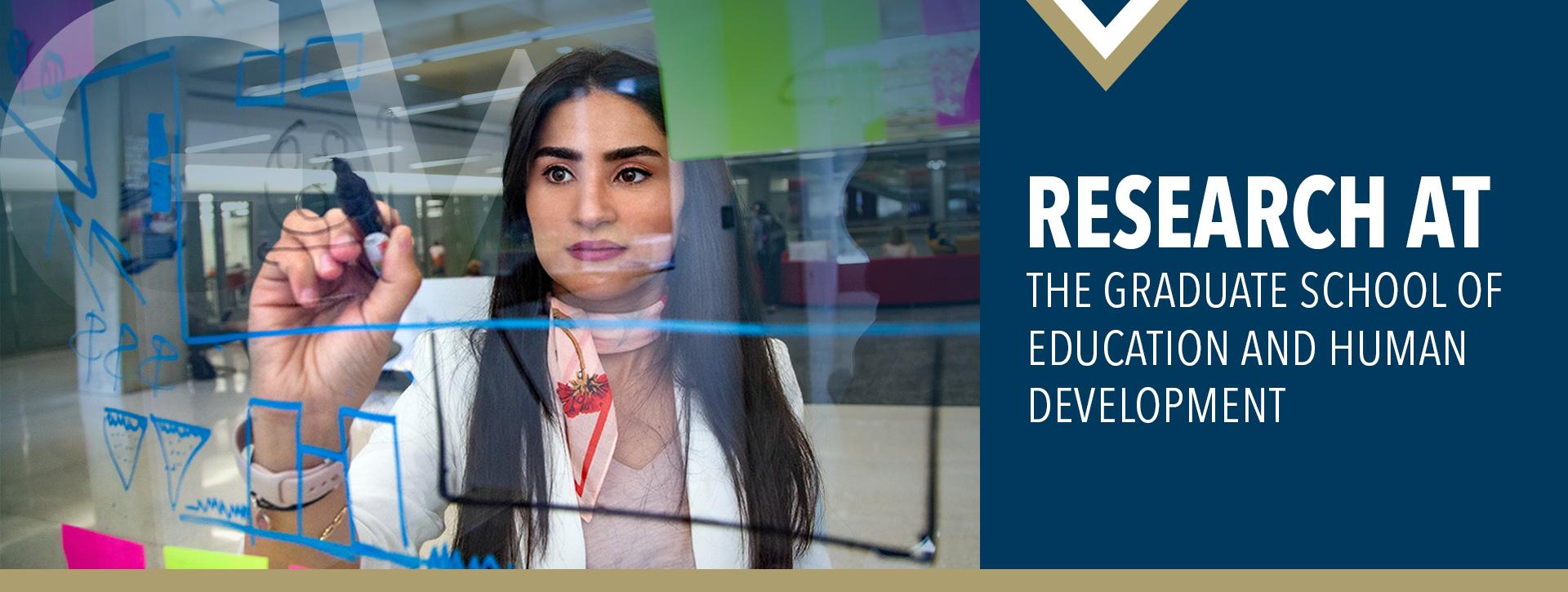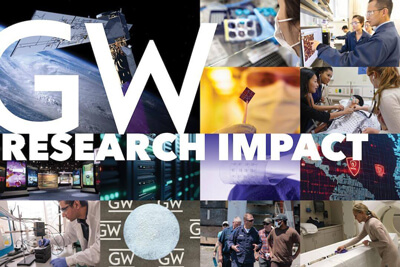GW UNESCO Chair and Fellowship Recognized by Forum on Education Abroad


With a steadfast commitment to advancing knowledge and innovation, GSEHD stands as a hub of scholarly excellence and transformative practices to guide meaningful change in the realms of education, counseling, policy, leadership, and human development. Our esteemed faculty guide passionate scholars through cutting-edge research endeavors to address pressing social challenges, explore the latest advancements in pedagogy, transform theory into practice, and empower all learners.
Through collaborative partnerships and interdisciplinary exploration, GSEHD cultivates a dynamic environment that empowers scholars, practitioners, and policymakers to address the most pressing challenges facing education and human development, both locally and globally, today. Committed to equity and justice, our research is relevant, timely, and contributes to the goal of social progress through education.
Our faculty draw from leading-edge research in such areas as intelligent technology and brain development to create knowledge relevant at all levels of education. It's exciting to see faculty and students use new findings to inform their coursework and solve problems of practice.
Dr. Max Freund
Associate Dean for Research and External Relations
Professor, Special Education and Disability Studies

The goal of the initiative, supported by the William and Flora Hewlett Foundation, is to bring together educators, policymakers and scholars to strengthen democratic values in education and develop innovative civic education strategies.

REAL focuses on empowering students as scholar-practitioners to research, publish, and drive meaningful change for refugees and at-risk migrants globally. Through joint research and advocacy projects, REAL serves as a catalyst for positive change in refugee and migrant education.

Faculty, students and alumni presented in 40 sessions at the American Educational Research Association (AERA) Annual Meeting in Denver, CO. Additionally, several led or chaired sessions and discussions.

Every day, researchers at GSEHD take on some of the world’s toughest challenges, delivering real-world impact and insights through their relentless pursuit of knowledge and a deeper understanding of our world. From empowering people with disabilities, to building trustworthy AI systems, much of their work is made possible through vital federal investments.

CRCRE prepares professionals to work with people with disabilities to reach their employment goals and better integrate into society. A recipient of major federal and state grants, the Center also helps state agencies better serve their residents through technical assistance, training, and research.

The Mayberg Center was created to advance community-based scholarship in the field of Jewish education and leadership, particularly in the arenas of pedagogy, identity, and literacy.

CASJE is dedicated to improving the quality of knowledge that can be used to guide the work of Jewish education. The organization supports research shaped by the wisdom of practice, practice guided by research, and philanthropy informed by a sound base of evidence.

The Collaboratory will enhance an already robust network of partnerships and assets to further advance the field of Jewish education and address modern challenges faced by the global Jewish community.

Get assistance with data analysis software or writing, request feedback, get extra support in related courses and more.
Faculty and students have access to the full range of research and teaching support from GW Libraries and Academic Innovation (LAI).
The library provides support for all stages of your research, including research strategy, finding sources, citation management, and more.
GSEHD faculty and researchers address the real-world challenges in education through their work. Sample research projects include:
This cross-disciplinary group of faculty is committed to cutting-edge research and innovation to tackle the complex challenges inherent in school improvement efforts in the U.S. Balancing rigorous education research with policy and practice expertise, as well as an intense commitment to participatory approaches, this team of faculty works in close partnership with communities and schools to examine and address effectively a wide variety of critical education issues. The work is grounded in an overarching focus on equity in education, an endeavor that requires a fundamental focus on school improvement. The cross-disciplinary group of faculty recognizes the urgent need to address these issues from a variety of disciplinary lenses, and uses research, policy and practice expertise in collaboration with educational partners to leverage local community strengths, address problems of local practice to create new knowledge for the field. The improvement sciences inform this work, and the expertise of the local education community is central to defining, wrestling with and iteratively tackling these problems of practice.
Researchers look to link educators, professionals, community leaders, families and youth to processes and resources to address issues of equity in educational policy, process, and outcomes. The RIG addresses a diverse range of research areas related to school improvement with particular focus on: equity factors, academic achievement, educational wellbeing, school performance, and graduation rates within economically disadvantaged communities and communities predominantly of color. The RIG aims to advance improvements in educational wellness and success through its commitments to improved student wellbeing and outcomes, teacher wellbeing, and institutional wellness.
The Educational Equity and School Improvement (EESI) Research Interest Group, organized in 2017, is quickly growing in interest amongst the Graduate School of Education and Human Development research faculty, the university and throughout the education community. Under the guidance of Dr. Elizabeth Tuckwiller and Dr. Rebecca Thessin, EESI offers research, policy, resources, translation, and capacity building to improve educational outcomes. The group collaborates with coalitions of teachers, support staff, principals, superintendents, state education agencies, and community agencies to help them determine how to best support positive educational outcomes for students, iterative and relentless improvement, and equitable opportunities to learn for all students.
Special education is a field that is significantly threatened by teacher shortages, according to the Teacher Shortage Area Nationwide Listing from the federal government. To address this shortage, Dr. Carol Kochhar-Bryant is leading the launch of a new online master’s program that will train teachers working with high-needs disabled students to transition into adulthood-- a program started with support from a $1.25 million grant from the U.S. Department of Education.
Students with acute brain injury and autism have been identified as high-need target populations by the U.S. Department of Education and most state education agencies. This program is one of a few in the United States and is the first to combine transition services with a focus on acute brain injury and autism. The degree will prepare educators to align the secondary general education curriculum with community-based learning and transition services and to promote the success of all students by nurturing and sustaining school cultures and instructional programs.
CASJE (Collaborative for Applied Studies in Jewish Education) is an alliance of researchers, practitioners, and philanthropic leaders dedicated to improving the quality of knowledge that can be used to guide the work of Jewish education. CASJE works with partners who see the value of research-informed evidence to address pressing challenges in Jewish communal life. Founded at Stanford University, CASJE’s programmatic home has been in the Graduate School of Education and Human Development at George Washington University since 2016. CASJE’s work is guided by an Advisory Board that includes Jewish educational leaders with a deep understanding of the diverse arenas in which Jewish education happens today and scholars of education from Boston College, Brandeis University, George Washington University, Harvard University, Stanford University, UC Berkeley, and Vanderbilt University.
CASJE's core operations are supported by generous grants from the Jim Joseph Foundation and Crown Family Philanthropies.
In 2013, the George Washington University released six papers to increase the understanding of how student behaviors and decisions can affect educational success. Written by an interdisciplinary group of researchers from around the country, including the George Washington University, the papers examine the impacts of students’ responses to the financial aid system, to information about college and to classroom and institutional processes. The project was commissioned by GSEHD and supported by the Bill & Melinda Gates Foundation.
The GSEHD Working Paper series provides an outlet for sharing high-quality research manuscripts written by GSEHD faculty and doctoral students.
SO YOU SAY OUR WORK IS ESSENTIAL: Essential Workers and the Potential for Transformational Learning and Change in the Wake of COVID 19 Social and Economic Disruption, by Ellen Scully-Russ, Maria Cseh, Lily Hakimi, Jerry Phillips, Henriette Lundgren, and DJ Ralston
Re-Imagining Higher Education Worldwide After COVID-19, a GW University Seminar Fund report by Kyle Long, Bernhard Streitwieser, and Ashley Fisher
Let's Stop Calling It "Hebrew School" - Rationales, Goals, and Practices of Hebrew Education in Part-Time Jewish Schools, a GSEHD collaboration with the Consortium for Applied Studies in Jewish Education (CASJE)
On the Journey: Concepts That Support a Study of the Professional Trajectories of Jewish Educators, a GSEHD collaboration with the Consortium for Applied Studies in Jewish Education (CASJE)
Reorienting the Roles of District Leaders: How Do Principal Supervisors Coach Principals to Lead Improvement? by Rebecca Thessin, Tamilah Richardson, and Coleen Reyes
DCPS Goes Global:Research on the District of Columbia Public Schools Study Abroad Program, 2017 Cohort by Laura Engel, Heidi Gibson, Clark Boothby, and Jessica Fundalinski
Four Point Leadership: The Necessary Bridge Between Policy and Educational Equity by Scott Joftus
Going Global: Impacts of 2016 District of Columbia Public Schools Study Abroad Program by Laura Engel, Jessica Fundalinski, and Heidi Gibson
Higher Education's Response to the European Refugee Crisis: Challenges, Strategies, and Opportunities by Bernhard Streitwieser, Cynthia Miller-Idriss, and Hans de Wit
The Tennessee Achievement School District: Race, History, and the Dilemma of Public Engagement by Joshua Glazer and Cori Egan

The research skills that I have developed while studying at GSEHD have had an immediate effect on my job. The connection between research and practice has been a great experience in my time at GSEHD.
Kevin Knudson, EdD in Human and Organizational Learning
View All Upcoming GSEHD Events >
Have an important research update you want to share? Recently published an article? Contact GSEHD comms to share the news.
tawaters![]() gwu [dot] edu (Contact Communications >)
gwu [dot] edu (Contact Communications >)
